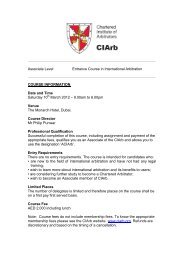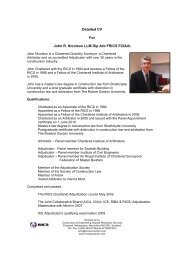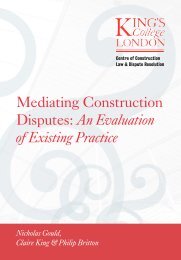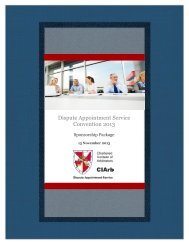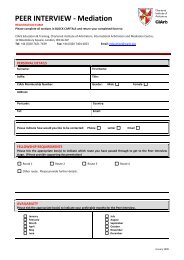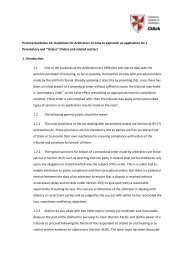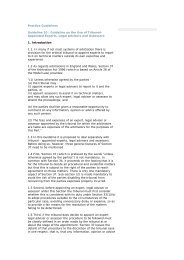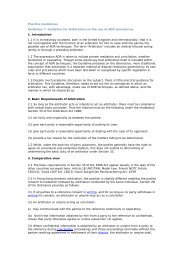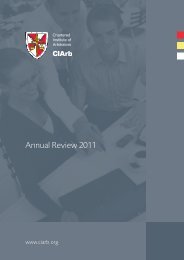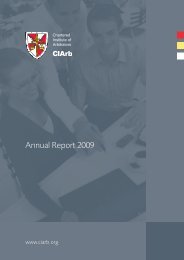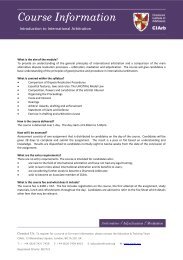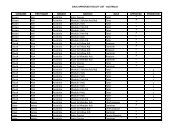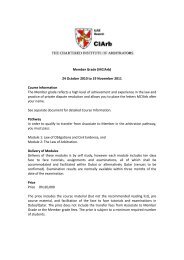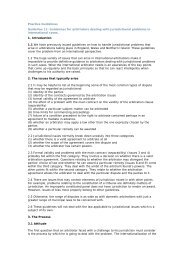Practice Guidelines - CIArb
Practice Guidelines - CIArb
Practice Guidelines - CIArb
Create successful ePaper yourself
Turn your PDF publications into a flip-book with our unique Google optimized e-Paper software.
<strong>Practice</strong> <strong>Guidelines</strong><br />
Guideline 9 : Guideline for Arbitrators on Making<br />
Orders Relating to the Costs of the Arbitration<br />
1. Introduction<br />
1.1 One of the most difficult and important functions which an<br />
arbitrator has to perform relates to the making of awards of<br />
costs. This guideline attempts to provide assistance on the<br />
main problems likely to be encountered in this area<br />
1.2 Generally, this Guideline assumes that the seat of the<br />
arbitration is in England and Wales or Northern Ireland so<br />
that the Arbitration Act 1996 applies. The Act contains a<br />
number of provisions dealing with the costs of an arbitration.<br />
There is, though, also a brief comparative law overview of the<br />
subject.<br />
1.3 Essentially the need for an award of costs arises because<br />
in the course of prosecuting or defending arbitration<br />
proceedings, the parties will or may incur costs of three<br />
different types<br />
(a) liability for the arbitrator’s fees and expenses;<br />
(b) liability for the fees and expenses of any arbitral<br />
institution involved; and<br />
(c) legal and other costs incurred directly by the parties.<br />
1.4 A party who is successful in prosecuting or resisting a<br />
claim will seek an order against the unsuccessful party for<br />
reimbursement of the costs which he has incurred. The order<br />
can be sought in relation to all three of the categories of cost<br />
set out above. An order of this kind is typically sought after<br />
the arbitrator has disposed of the main issues of liability and<br />
quantum raised by the claim. It may however be sought at an<br />
earlier stage; for example, at the stage of a partial (or<br />
interim) award under Section 47 of the Act.<br />
1.5 The arbitral tribunal normally has a wide discretion as to<br />
making awards of costs and this enables it to have regard to<br />
the particular circumstances of the case and to make an order<br />
which seems fair in all the circumstances. There are inevitably<br />
however principles which have to be observed.<br />
1.6 The Civil Procedure Rules, which deal with the making of<br />
orders for costs in actions before the Court, do not apply to<br />
arbitration and thus have no direct impact on orders to be<br />
made by arbitrators. Nor is there any longer any requirement<br />
that arbitrators must act “judicially” in the sense that they<br />
must follow the same principles as would be adopted by the<br />
Court in making an order for costs.<br />
1.7 On the other hand, the Act lays down certain principles<br />
most of which are non-mandatory in the sense that the<br />
parties may contract out of them. The most important of<br />
these is that, unless the parties otherwise agree, the tribunal<br />
must “award costs on the general principle that costs should<br />
follow the event” (Section 61(2)). Where an arbitrator is<br />
dealing with the amount of the recoverable costs (as opposed<br />
to their allocation between the parties), the arbitral tribunal is<br />
given a wide measure of freedom to determine the basis on<br />
which the assessment is to be made. But, if the parties do not<br />
otherwise agree and the arbitral tribunal does not otherwise
determine, the arbitral tribunal must determine the<br />
recoverable costs on the basis set out in the Act (Section<br />
63(5)). It is important that when making an award of costs an<br />
arbitrator should have regard to the relevant principles.<br />
Should he misdirect himself a party may seek leave to appeal<br />
to the Court on a point of law.<br />
2. Topics to be Covered<br />
This guideline addresses the following topics:<br />
(1) Allocating the costs of the arbitration between the parties.<br />
(2) Determining the recoverable costs of the arbitration.<br />
(3) Capping the recoverable costs.<br />
(4) Security for costs.<br />
3. Comparative View<br />
3.1 The detailed nature of the Arbitration Act 1996 contrasts<br />
with the position under most modern arbitration statutes<br />
around the world. Notably, the UNCITRAL Model Law, the<br />
French NCPC, the Swiss LDIP, the US Federal Arbitration Act,<br />
the Belgian and Dutch statutes are all silent on the subject.<br />
The arbitral tribunal under these provisions is assumed to<br />
have a broadly unfettered discretion on the subject.<br />
3.2 The Swedish Act contains one brief provision:<br />
“Section 42<br />
Unless otherwise agreed by the parties, the arbitrators may,<br />
upon request by a party, order the opposing party to pay<br />
compensation for the party's costs and determine the manner<br />
in which the compensation to the arbitrators shall be finally<br />
allocated between the parties. The arbitrators' order may also<br />
include interest, if a party has so requested.”<br />
3.3 Section 1057 of the German ZPO says:<br />
“(1) Unless the parties agree otherwise, the arbitral tribunal<br />
shall allocate, by means of an arbitral award, the costs of the<br />
arbitration as between the parties, including those incurred by<br />
the parties necessary for the proper pursuit of their claim or<br />
defence. It shall do so at its discretion and take into<br />
consideration the circumstances of the case, in particular the<br />
outcome of the proceedings.<br />
(2) To the extent that the costs of the arbitral proceedings<br />
have been fixed, the arbitral tribunal shall also decide on the<br />
amount to be borne by each party. If the costs have not been<br />
fixed or if they can only be fixed once the arbitral proceedings<br />
have been terminated, the decision shall be taken by means<br />
of a separate award.”<br />
3.4 Section 2GJ of the Hong Kong Ordinance provides:<br />
“(1) An arbitral tribunal may include in an award directions<br />
with respect to the costs of the relevant arbitration<br />
proceedings (including the fees and expenses of the tribunal)<br />
and in so doing may do all or any of the following-<br />
a) direct to whom and by whom and in what manner costs of<br />
arbitration proceedings are to be paid;
) tax and settle the amount of costs to be so paid;<br />
c) direct costs to be paid on any basis on which the Court can<br />
award costs in civil proceedings before the Court. This<br />
subsection is subject to any contrary provision of the relevant<br />
arbitration agreement.<br />
(2) Costs awarded in respect of arbitration proceedings (other<br />
than the fees or expenses of the arbitral tribunal) are taxable<br />
by the Court, unless the award otherwise directs. This<br />
subsection does not limit the operation of section 21(1).”<br />
3.5. In US arbitration practice, it is unusual for an arbitrator<br />
to award attorney fees unless the parties have specifically<br />
agreed to this.<br />
3.6. The UNCITRAL Rules contain detailed provisions on the<br />
subject in Articles 38-40. Article 38 empowers the tribunal to<br />
fix the costs including the fees of each arbitrator, the<br />
expenses of the tribunal and each of its members, expert<br />
assistance received by the arbitrators, the costs of the<br />
appointing authority and, to the extent that they are<br />
reasonable, the expenses of the witnesses and lawyers’ fees.<br />
The latter must be expressly claimed. Article 39 requires the<br />
arbitrators’ fees to be reasonable having regard to the<br />
amount in dispute, the complexity of the case, time spent on<br />
it and any other circumstances.<br />
3.7 Article 40 adopts a costs follow the event approach<br />
although it allows the tribunal generally to apportion costs<br />
and lawyers’ fees as it considers reasonable.<br />
3.8 The Tribunal cannot charge extra amounts for interpreting<br />
or completing its award under articles 35 to 37 of the rules.<br />
3.9 Outside England, a court challenge to an award on costs<br />
would be highly unlikely to succeed since it would have to be<br />
based on a breach of public policy or, in the US, a manifest<br />
disregard of the law.<br />
3.10 Section 2GJ(2) of the Hong Kong Ordinance is alone<br />
among the legal systems covered here in allowing the court to<br />
tax costs.<br />
3.11 In Australia the provisions of the Model Law have been<br />
complemented by section 27 of the International Arbitration<br />
Act 1974.This reads:<br />
(1) Unless the parties to an arbitration agreement have<br />
(whether in the agreement or in any other document in<br />
writing) otherwise agreed, the costs of an arbitration<br />
(including the fees and expenses of the arbitrator or<br />
arbitrators) shall be in the discretion of the arbitral tribunal.<br />
(2) An arbitral tribunal may in making an award:<br />
(a) direct to whom, by whom, and in what manner, the whole<br />
or any part of the costs that it awards shall be paid;<br />
(b) tax or settle the amount of costs to be so paid or any part<br />
of those costs; and<br />
(c) award costs to be taxed or settled as between party and<br />
party or as between solicitor and client.
(3) Any costs of an arbitration (other than the fees or<br />
expenses of an arbitrator) that are directed to be paid by an<br />
award are, to the extent that they have not been taxed or<br />
settled by the arbitral tribunal, taxable in the Court having<br />
jurisdiction under Article 34 of the Model Law to hear<br />
applications for setting aside the award.<br />
(4) If no provision is made by an award with respect to the<br />
costs of the arbitration, a party to the arbitration agreement<br />
may, within 14 days after receiving the award, apply to the<br />
arbitral tribunal for directions as to the payment of those<br />
costs, and thereupon the tribunal shall, after hearing any<br />
party who wishes to be heard, amend the award by adding to<br />
it such directions as the tribunal thinks proper with respect to<br />
the payment of the costs of the arbitration.<br />
4. Allocating the costs of the arbitration between the<br />
parties<br />
4.1 By Agreement<br />
Generally the parties are free to reach agreement on the<br />
principles to be followed when an arbitrator is asked to make<br />
an order allocating the costs between the parties. There is<br />
one mandatory provision. This is that an agreement that one<br />
party is to pay the whole or part of the costs “in any event” is<br />
only valid if made after the dispute has arisen (Section 60).<br />
The section is based on public policy and invalidates any<br />
agreement that one party shall pay the other’s costs whatever<br />
the outcome of the arbitration (or even that no costs shall be<br />
recoverable) unless made after the dispute has arisen.<br />
4.2 Arbitration Rules incorporated into the agreement<br />
4.2.1 Apart from this it is important that arbitrators should<br />
examine the contract between the parties to see if there is<br />
any provision relating to costs. Where the contract<br />
incorporates rules (eg the CIMAR or UNCITRAL Rules or the<br />
rules of an arbitral institution) those rules should be likewise<br />
examined. The principles that they lay down for the allocation<br />
of costs, those principles will or may displace or supplement<br />
the principles laid down by the 1996 Act.<br />
4.2.2 Where the Rules of the Australian Centre for<br />
International Commercial Arbitration are incorporated by the<br />
agreement of the parties Rule 41 is applicable.<br />
4.3. In the absence of any agreement<br />
4.3.1 Except as provided in Article 41.2, the costs of<br />
arbitration shall in principle be borne by the unsuccessful<br />
party. However, the Arbitral Tribunal may apportion each of<br />
such costs between the parties if it determines that<br />
apportionment is reasonable, taking into account the<br />
circumstances of the case.<br />
4.3.2 With respect to the costs referred to in Article 39(e),<br />
the Arbitral Tribunal, taking into account the circumstances of<br />
the case, shall be free to determine which party shall bear<br />
such costs or may apportion such costs between the parties if<br />
it determines that apportionment is reasonable.
4.3.3 When the Arbitral Tribunal issues an order for the<br />
termination of the arbitral proceedings or makes an award on<br />
agreed terms, it shall fix the costs of arbitration referred to in<br />
Article 39 in that order or award.<br />
4.3.4 No additional fees may be charged by an Arbitral<br />
Tribunal for interpretation or correction or completion of its<br />
award under Articles 36 to 38.<br />
4.3.5 Where there is no relevant agreement Section 61(2) of<br />
the Act provides:-<br />
“..... the tribunal shall award costs on the general principle<br />
that costs should follow the event except where it appears to<br />
the tribunal that in the circumstances this is not appropriate<br />
in relation to the whole or part of the costs”.<br />
4.3.6 The general principle that “costs should follow the<br />
event” is taken from the case-law applied by the Court prior<br />
to the coming into effect of the Civil Procedure Rules 1998.<br />
The concept is worded indirectly so that its meaning may not<br />
be entirely clear to the non-lawyer. It requires the arbitrator<br />
to consider what was the relevant “event”. In most cases this<br />
can be equated with the outcome of the arbitration viewed in<br />
terms of the relative success of each party. Accordingly it<br />
would have been possible to express the general principle<br />
more directly, without change to its meaning, by adopting the<br />
formula that, as a general rule, the unsuccessful party should<br />
be ordered to pay the costs of the successful party. But<br />
difficulty can arise on either formulation in deciding what was<br />
the relevant “event” which costs should follow or,<br />
alternatively, what constituted “success.”<br />
4.3.7 It is important to note that Section 61(2) lays down a<br />
general principle followed by a wide exception “except where<br />
it appears to the tribunal that in the circumstances this is not<br />
appropriate in relation to the whole or part of the costs”. The<br />
exception gives effect to the broad principle that an arbitrator<br />
has a wide discretion in awarding costs. An arbitrator is<br />
entitled to have regard to all the circumstances including<br />
(i) the conduct of the parties<br />
(ii) whether a party has succeeded on part of its case even if<br />
it has not been wholly successful<br />
(iii) whether a successful party has failed on issues on which<br />
substantial amounts of time were spent<br />
(iv) any offer to settle the case drawn to the arbitrator’s<br />
attention.<br />
4.3.8 It is necessary to bear in mind that Section 61(2)<br />
requires an arbitrator to consider both the general principle<br />
and also the exception. In theory these should be considered<br />
separately though this is not always possible. What is<br />
important is that an arbitrator ought not to disregard the<br />
general principle unless there are grounds for so doing.<br />
Consequently if an arbitrator should decide that in the<br />
particular case it is not appropriate to award the successful<br />
party its costs (or that it appropriate to deprive the successful<br />
party of a proportion of its costs), the arbitrator should be<br />
prepared to justify his decision. The best course in those<br />
circumstances is for the arbitrator to set out in the award his<br />
reasons why in the circumstances it was not appropriate to
award costs on the principle that they followed the event. In<br />
some cases this is essential.<br />
4.3.9 A failure to provide satisfactory reasons can result in a<br />
challenge to the award of costs on the basis of an error of law<br />
under section 69(1). This can be excluded by agreement,<br />
notably to be bound by the ICC or LCIA rules.<br />
4.3.10 The application of both the principle and the exception<br />
must depend very much on the circumstances of each<br />
arbitration and it is only possible to offer very general<br />
guidance to a few of the problems likely to be encountered in<br />
practice.<br />
4.4. Recovery of Monetary Awards<br />
4.4.1 If a claimant recovers a monetary award, he is normally<br />
to be regarded as successful since he had to bring the<br />
arbitration in order to recover the sum in question. The<br />
“event” is the recovery of money. It is normally no ground for<br />
depriving the claimant of his costs that the amount recovered<br />
is less than that claimed unless the recovery is so small that it<br />
can be regarded as nominal or derisory.<br />
4.4.2 The position may however be very different if the<br />
respondent has previously offered to pay the sum awarded<br />
(see under “settlement offers” below). If, moreover, a<br />
claimant who has succeeded in recovering a monetary award<br />
can be shown to have exaggerated his claim, it may<br />
sometimes be proper to deprive him of part (or even,<br />
exceptionally, the whole) of his costs. Much depends on the<br />
particular circumstances. If, for example, the exaggeration<br />
was not bona fide and led to a large increase in the cost of<br />
the arbitration, this could be a reason why it would not be<br />
appropriate to award the claimant the whole of his costs.<br />
Although (in the absence of an offer to pay the sum awarded)<br />
the outcome of the arbitration can be said to have justified<br />
the claimant in bringing it, nevertheless it may be appropriate<br />
that any extra time or cost incurred through exaggeration of<br />
the claim should be reflected in the eventual costs order.<br />
(Only in very exceptional circumstances would it be right to<br />
order a successful claimant to pay the respondent’s costs).<br />
4.4.3 Where there is a counterclaim and both parties recover<br />
monetary awards, the claimant on the claim and the<br />
respondent on the counterclaim, more difficult questions can<br />
arise. If the claim and counterclaim are closely related, as<br />
where they both arise out of the same transaction or series of<br />
transactions, it is normally the right course to set-off the two<br />
awards and to award costs to whichever party is shown to be<br />
entitled to a net recovery after deduction of the other award.<br />
In cases where there is no such link between the awards, it<br />
may be appropriate to award the costs of the claim to the<br />
claimant and the costs of the counterclaim to the respondent.<br />
There may also be circumstances which justify a special order<br />
for costs (see below under “partial success”).<br />
4.5. The Conduct of the Parties<br />
4.5.1 Generally an arbitrator should exclude from<br />
consideration any matter not strictly connected with the<br />
arbitration or with the claims made in it. A general
disapproval of a claimant’s conduct is still no ground for<br />
refusing to apply the general principle. The question whether<br />
it was reasonable for a party to raise pursue or contest a<br />
particular allegation is, on the other hand, a relevant matter<br />
and if the arbitrator considers that the hearing has been<br />
prolonged by unreasonable conduct of this kind he is fully<br />
entitled to make an order which reflects this view (eg by<br />
depriving the successful party of a proportion of its costs).<br />
4.5.2 However, in deciding whether it was reasonable for a<br />
claimant to bring a particular claim the arbitrator should act<br />
by reference to objective criteria (in particular whether the<br />
claim has been successful) and should exercise great caution<br />
before depriving a successful claimant of his costs merely<br />
because of the arbitrator’s personal feeling that the claim was<br />
immoral, lacked merit or for some other reason ought not to<br />
have been brought.<br />
4.6. Partial Success<br />
4.6.1 There can be many situations where a party who has<br />
succeeded on part of his case (and has consequently obtained<br />
an award) has not been wholly successful. In many instances<br />
it would not be fair to penalise a successful party for having<br />
raised issues or made claims which have ultimately been held<br />
to be unsustainable. If it was reasonable to raise these issues<br />
or claims and if they have not led to a substantial extra<br />
expenditure of time or money, then it may be fair to award<br />
the claimant the whole of his costs on the basis of the<br />
principle “costs follow the event”.<br />
4.6.2 The position however may be different if a successful<br />
party has failed on issues on which substantial amounts of<br />
time and money were spent. In such circumstances it may be<br />
appropriate to award to the successful party the general costs<br />
of the arbitration (to include the cost of issues on which he<br />
has succeeded) but to award to the party who has been<br />
unsuccessful overall the costs of the issues on which that<br />
party has succeeded.<br />
4.6.3 Orders of this kind can be difficult to administer not only<br />
because it is often difficult to separate the costs attributable<br />
to particular issues but also because such an order may<br />
require the tribunal to quantify the recoverable costs of both<br />
the successful and the unsuccessful parties. It is usually<br />
therefore more convenient and practicable to make allowance<br />
for issues on which the successful party has failed, by<br />
awarding to the successful party a proportion only of his<br />
costs, after making a necessarily approximate attempt to<br />
ensure that the proportion awarded mirrors the degree overall<br />
to which the successful party has succeeded on the more<br />
important issues to which time and money were devoted. If<br />
this approach is adopted, the arbitrator must bear in mind, in<br />
assessing what proportion should be awarded to the<br />
successful party, that the party which was unsuccessful<br />
overall will not be making any recovery of the costs relating<br />
to the issues on which he succeeded.<br />
4.6.4 If the arbitrator is required to make an award of costs<br />
after the main issues of liability and costs have been<br />
determined, it is usually possible for him to stand back and,<br />
after reviewing the conduct of the arbitration as a whole,
determine the proportion of the more important issues on<br />
which either party has succeeded, and to make an order<br />
which reflects this.<br />
4.7. Preliminary issues<br />
4.7.1 Sometimes particular points are taken as preliminary<br />
issues and the arbitrator is asked to make an award of costs<br />
at the time of issuing a partial/interim award dealing with that<br />
issue. If faced with an application of this kind the arbitrator<br />
has a number of different choices available to him:<br />
(a) he may award the costs of the preliminary issue to the<br />
party in whose favour he decides that issue (either with or<br />
without an order that those costs be determined and paid<br />
immediately).<br />
(b) he may make an order for “costs in the arbitration”. The<br />
effect is that the party who obtains an order for costs at the<br />
end of the arbitration is entitled to his costs of the particular<br />
part of the proceedings to which the order relates.<br />
(c) he may order “costs reserved”. This means that the<br />
decision about costs is deferred to a later occasion when, it is<br />
to be hoped, the arbitrator will be better able to look at the<br />
particular issue in the overall context of the whole arbitration.<br />
Where he has ordered “costs reserved”, the arbitrator should<br />
make sure that the costs are dealt with at the end of the<br />
arbitration when the topic of costs as a whole is being<br />
addressed.<br />
4.7.2 A choice between these various orders will depend on a<br />
large number of factors. Sometimes it is appropriate to view<br />
the preliminary issue as a discrete “case within a case”. In<br />
such a situation it may be appropriate to order the costs of<br />
that issue to the winner on the ground that the relevant<br />
“event” is the outcome of the issue. In other circumstances it<br />
may be productive of potential unfairness to make an<br />
immediate order as to the costs of the issue. In that situation<br />
“costs reserved” may better serve the interests of fairness.<br />
There are also circumstances where it is clear that the party<br />
who ultimately succeeds should recover the costs of the issue<br />
so that “costs in the arbitration” is the appropriate order.<br />
4.8. Settlement Offers<br />
4.8.1 The making of a settlement offer during the course of<br />
an arbitration may have an important bearing on any award<br />
of costs. If there has been no settlement offer, it will be hard<br />
for an unsuccessful respondent to dispute that it was<br />
necessary for the claimant to incur the costs of the arbitration<br />
in order to obtain the monetary award which has been made.<br />
By contrast if the respondent has offered to settle in the<br />
course of the arbitration and the claimant eventually recovers<br />
less than the sum which was offered, it will have been a<br />
waste of time and money to pursue the arbitration for the<br />
period after the time when the settlement offer was made and<br />
could have been accepted.<br />
4.8.2 The making of a settlement offer can thus have the<br />
effect that the relevant “event” after the date of the offer is<br />
whether or not the claimant has been successful in recovering
more than has been offered. Another way of looking at the<br />
matter is that it would not be appropriate to allocate costs on<br />
the principle that costs should follow the event in relation to<br />
the period following the offer.<br />
4.8.3 Settlement offers may be made in a wide variety of<br />
different situations. In this Guideline it is proposed to consider<br />
the typical situation where a respondent is facing a claim<br />
which is likely to succeed to some extent but for a lesser sum<br />
than has been put forward. The respondent wishes to obtain<br />
some protection against having to pay the whole costs of the<br />
arbitration. He can do this by making a settlement offer.<br />
There are three kinds of offer which can be made, namely<br />
“without prejudice”, “sealed” and “open” offers. A fully<br />
“without prejudice” offer can never be referred to by either<br />
party at any stage of the proceedings (and so confers no<br />
protection in respect of costs). A “sealed” offer (sometimes<br />
called a “Calderbank” offer) is one which is made on the<br />
express or implied understanding that it will not be revealed<br />
to the tribunal until liability and quantum have been decided<br />
and the stage is reached when the question of costs is to be<br />
decided. (A “sealed offer” may be made in correspondence<br />
between the parties or it may be placed in a sealed envelope<br />
which is delivered to the arbitrator to be opened only after all<br />
substantive issues have been decided). An “open” offer is one<br />
to which either party can refer at any stage of the<br />
proceedings. Normally the “sealed offer” method is adopted<br />
so as to avoid any possibility of the arbitrator being influenced<br />
by the offer when considering liability or quantum.<br />
4.8.4 Assuming that a sealed offer is drawn to the arbitrator’s<br />
attention at the stage when he is required to allocate the<br />
costs of the arbitration, there are certain points which he<br />
should bear in mind.<br />
4.8.4.1 First, the arbitrator must take the offer into account in<br />
making his decision as to costs. While he retains a general<br />
discretion in awarding costs, the offer is clearly a material<br />
factor.<br />
4.8.4.2 Second, the overriding question will be whether the<br />
claimant has achieved more by going on with the arbitration<br />
and obtaining an award than he would have done by<br />
accepting the offer. This equation requires the arbitrator to<br />
assess the value of the offer which was made. If the offer was<br />
made in a form which included a fixed sum together with<br />
interest to the date of the offer plus payment of the<br />
claimant’s recoverable costs to be assessed, then it should be<br />
relatively simple for the arbitrator to come to a conclusion<br />
whether or not the claimant has done better by going on with<br />
the arbitration than by accepting the offer. If however the<br />
offer is for a fixed sum which includes costs, it may be<br />
difficult, or even impossible, for the arbitrator to determine<br />
whether, taking the claimant’s costs into account at the stage<br />
when the offer could have been accepted, the net sum<br />
remaining would have been more or less than the sum<br />
eventually awarded. (In such circumstances the offer may<br />
have to be disregarded). Similarly if there is no offer to pay<br />
interest on top of the sum which is offered, that is a factor<br />
which will need to be evaluated when comparing the offer<br />
with what has been awarded.
4.8.4.3 Third, if the arbitrator finds that the claimant would<br />
have achieved the same or more by accepting the offer than<br />
by going on with the arbitration, the usual order to make is<br />
that the claimant is to recover his costs up to the time when<br />
the offer could have been accepted and that in respect of the<br />
period after that time the respondent is to recover his costs<br />
from the claimant. If however the claimant has achieved more<br />
by going on with the arbitration than he would have achieved<br />
by accepting the offer, the offer will have no effect on the<br />
arbitrator’s order as to costs and it will be proper to approach<br />
the subject of costs as if no offer had been made. In deciding<br />
whether the claimant has done better by going on with the<br />
arbitration, it is necessary to make a precise comparison of<br />
the benefit to the claimant in accepting the offer as compared<br />
with the eventual award, so that if the claimant “beats” the<br />
offer, even by a small margin, the offer will have no effect,<br />
unless of course there are special circumstances which affect<br />
the matter.<br />
4.8.4.4 Fourth, in cases where the respondent has made a<br />
counterclaim, the offer should say whether the counterclaim<br />
has been taken into account. If the offer does not do this and<br />
there are no surrounding factors to indicate whether the<br />
counterclaim has been taken into account, the offer should be<br />
presumed to refer only to the claim. If it refers also to the<br />
counterclaim, the arbitrator should consider whether it is<br />
appropriate to make a single order for costs; if it is, he should<br />
compare the success which the claimant has achieved in both<br />
pursuing the claim and resisting the counterclaim with that<br />
which he would have achieved in both respects by accepting<br />
the offer.<br />
4.8.4.5 Fifth, if the offer is made so as to be open for<br />
acceptance for only a limited period, questions can arise as to<br />
whether it should reasonably have been accepted; no hard<br />
and fast rules can be laid down. Similarly, it is not possible to<br />
offer useful guidance in cases where the offer was ambiguous,<br />
incomplete or conditional, save to say that the arbitrator will<br />
be more impressed by the ambiguity or incompleteness of an<br />
offer if the claimant wrote to the respondent pointing it out in<br />
contemporary correspondence than if he refers to it for the<br />
first time in his submissions as to why the offer should not be<br />
taken into account.<br />
4.8.4.6 Sixth, it should be borne in mind that in a case where<br />
the claimant would have achieved more by accepting the offer<br />
than by pursuing the arbitration there can be additional<br />
factors, such as the unreasonable conduct of one or both<br />
parties, which can have the result of making it reasonable to<br />
deprive the claimant of all or part of his costs for the period<br />
up to the time when the offer could have been accepted or to<br />
deprive the respondent of all or part of his costs in respect of<br />
the period after that time.<br />
4.8.4.7 Finally there are circumstances where a claimant (not<br />
the respondent) may wish to make a sealed offer to settle the<br />
case on terms which would give the claimant less than a full<br />
recovery. The object of so doing is so that if the offer is<br />
rejected and the claimant goes on with the arbitration, then<br />
(a) if he obtains a full recovery, he may be able to make a<br />
claim for “indemnity” costs in respect of the period after the<br />
offer could have been accepted (see below under
“determining the recoverable costs of the arbitration”) and (b)<br />
if he fails to make a full recovery but recovers only the<br />
amount specified in the sealed offer, he will have grounds for<br />
arguing that he should not be deprived of any proportion of<br />
his costs on the basis that he has been only partially<br />
successful.<br />
5. Determining the Recoverable Costs of the Arbitration<br />
5.1 Introduction<br />
5.1.1 An arbitrator’s award as to liability for costs may take<br />
any of the following forms:<br />
Party A shall pay Party B its costs of the arbitration<br />
Party A shall pay Party B its costs of the arbitration on an<br />
indemnity basis<br />
Party A shall pay Party such-and-such a fraction of its costs of<br />
the arbitration<br />
Party A shall pay Party B its costs of issues X, Y and Z only<br />
Party A shall pay Party B its costs of the arbitration up to a<br />
such-and-such date or event.<br />
5.1.2 An award in any of the above forms is not immediately<br />
enforceable. The amount of costs recoverable by the<br />
“receiving party” from the “paying party” must first be<br />
determined. Under Section 63(1) of the Act the parties are<br />
free to agree what costs of the arbitration are recoverable and<br />
they very often reach an agreement as to the amount of the<br />
recoverable costs. If they do not, the arbitral tribunal may<br />
determine by award the recoverable costs of the arbitration<br />
and the Act in Section 63(3) requires the tribunal to specify<br />
the basis on which it has acted. Finally, if the arbitral tribunal<br />
does not determine the recoverable costs, Section 63(4)<br />
enables any party to the arbitral proceedings to apply to the<br />
Court to determine the recoverable costs. It is however rarely<br />
in the interests of the parties for an arbitrator to refrain from<br />
determining the costs and thereby to leave their<br />
determination to the Court.<br />
5.1.3 An order for the determination of the recoverable costs<br />
is typically sought after the arbitrator has disposed of the<br />
main issues of liability and quantum raised by the claim and<br />
after he has made an order allocating the costs between the<br />
parties (as in paragraph 35 above). There are however other<br />
situations in which the recoverable costs may have to be<br />
quantified. For example in some arbitrations it may be<br />
ordered or expected that the tribunal will determine the costs<br />
at the same time as it makes the order allocating them<br />
between the parties and, where this is so, the parties will<br />
usually be prepared at that hearing to provide itemised lists of<br />
the costs which they have incurred so that an assessment can<br />
be made. Another example is where the tribunal is being<br />
asked to make a partial/interim award and one party is<br />
seeking an order that it be paid the costs of that award and<br />
that payment be made immediately without awaiting the<br />
outcome of the arbitration as a whole. In all these different<br />
situations, however, certain basic principles apply.<br />
5.2 Basis of the Determination<br />
5.2.1 If the arbitrator determines the recoverable costs of the
arbitration it is incumbent upon him to specify the “basis” on<br />
which he has acted. That basis may be one which has been<br />
agreed by the parties. If there has been no such agreement,<br />
then the arbitral tribunal may determine the recoverable costs<br />
“on such basis as it thinks fit”, provided that it is specified.<br />
Finally if the basis is neither agreed by the parties nor<br />
specified by the tribunal, costs are to be determined on the<br />
basis set out in Section 63(5) of the Act, namely<br />
“(a) . . . . . That there shall be allowed a reasonable amount<br />
in respect of all costs reasonably incurred, and<br />
(b) any doubt as to whether costs were reasonably incurred<br />
or were reasonable in amount shall be resolved in favour of<br />
the paying party”.<br />
5.2.2 Section 63(5) sets out the “standard” basis for<br />
determining recoverable costs in litigation as adopted by the<br />
Court prior to the coming into effect of the Civil Procedure<br />
Rules 1998. The two points to notice are (i) that the key to<br />
recovery is whether costs were “reasonably incurred” and (ii)<br />
that the burden of proving reasonableness is on the receiving<br />
party.<br />
5.2.3 Traditionally “reasonableness” has been determined on<br />
an item by item basis. If the item was reasonably incurred<br />
and the charge for it was in line with the level of costs<br />
generally charged at the time and in the circumstances when<br />
the professional charges were rendered, it was normally<br />
accepted as being reasonable and therefore recoverable. But<br />
since 1998 the Court has enquired, not only whether costs<br />
were “reasonable”, but also whether they were<br />
“proportionate”.<br />
5.2.4 The requirement of “proportionality” is as difficult to<br />
define as that of reasonableness. It can however be explained<br />
by the following example. Suppose a claimant in an<br />
arbitration advances a claim for £5,000 damages and is<br />
wholly successful in recovering that amount but, in so doing,<br />
incurs costs amounting to £100,000 and suppose each item,<br />
examined in isolation, is reasonable, still a bill of £100,000<br />
might be regarded as wholly disproportionate to the sum<br />
involved and therefore not recoverable. The concept of<br />
“proportionality” requires the tribunal to take a global<br />
approach.<br />
5.2.5 One factor is whether the costs are proportionate by<br />
reference to the sum at stake but the sum at stake is only<br />
one factor among many.<br />
These include:-<br />
(1) the conduct of all the parties;<br />
(2) the amount or value of any money or property involved;<br />
(3) the importance of the matter to all the parties;<br />
(4) the particular complexity of the matter or the difficulty or<br />
novelty of the questions raised;<br />
(5) the skill, effort, specialized knowledge and responsibility<br />
involved;<br />
(6) the time spent on the case<br />
(7) the place where and the circumstances in which work or<br />
any part of it was done.<br />
(See Rule 44.5(3) of the Civil Procedure Rules).
5.2.6 There is no doubt that an arbitrator is entitled to take<br />
into account whether the receiving party’s costs were<br />
“proportionate” and many arbitrators have always done this.<br />
A difficulty is created by the fact that Section 63(5) refers<br />
only to reasonableness. It is thought that an arbitrator could<br />
not be criticised if he regarded proportionality as an aspect of<br />
reasonableness. The safest course however is for the<br />
arbitrator to specify the “basis” on which he has acted in<br />
determining costs by reference to a formula which includes a<br />
reference to proportionality.<br />
5.2.7 This can be done in many ways, one of which is for the<br />
arbitrator to follow the Civil Procedure Rules 1998 (see Rules<br />
44.4(2) and 44.5(1)) by stating that he has adopted the basis<br />
set out in Section 63(5) supplemented by the following:<br />
(1) the tribunal will only allow costs which are reasonably<br />
incurred and are proportionate to the matters in issue; and<br />
(2) will resolve any doubt as to whether costs were<br />
reasonably incurred or reasonable and proportionate in<br />
amount in favour of the paying party.<br />
5.2.8 An arbitrator is entitled to adopt this formula for<br />
determining costs on the “standard” basis, provided of course<br />
that the parties have not agreed otherwise. The arbitrator<br />
should however (a) notify the parties in advance that he<br />
proposes to do this so that they have an opportunity to<br />
comment and (b) specify in his award that he has acted on<br />
this basis.<br />
5.2.9 The alternative basis for determining the recoverable<br />
costs is the so-called “indemnity” basis. This normally gives a<br />
somewhat higher recovery than the “standard” basis and is<br />
thus more favourable to the receiving party. There is one<br />
feature of “indemnity” costs which is the same as in<br />
“standard” costs; in both cases the tribunal should disallow<br />
costs which have been unreasonably incurred or were<br />
unreasonable in amount. But the Civil Procedure Rules (Rule<br />
44.4(3)) define the indemnity basis as one where “the court<br />
will resolve any doubt which it may have as to whether costs<br />
were reasonably incurred or were reasonable in amount in<br />
favour of the receiving party”. This amounts to a partial<br />
reversal of the normal burden of proof on issues of<br />
reasonableness. In addition, it has been held that no question<br />
of proportionality arises where indemnity costs are concerned,<br />
though it can be difficult to distinguish between issues of<br />
reasonableness and issues of proportionality. The grounds on<br />
which indemnity costs can or should be ordered are briefly<br />
considered in paragraph 5.6.6 below.<br />
5.3 Summary<br />
5.3.1 To summarize, the arbitrator may be asked to award<br />
costs either on the “standard” or on the “indemnity” basis. He<br />
may decide on the indemnity basis on his own motion<br />
provided that he gives notice of his intention so that the<br />
parties have an opportunity to comment. If he decides on the<br />
“standard” basis, he may adopt Section 63(5) or he may<br />
adopt a basis which includes the test of proportionality. Again<br />
he may be asked to do this or he may do it on his own
motion.<br />
5.3.2 Provided that he complies with his duty under Section<br />
33(1) to act fairly and impartially his award is not likely to be<br />
the subject of a successful challenge. He should however<br />
always specify in his award the basis on which he has acted.<br />
5.4 Procedure<br />
5.4.1 There is no need for the arbitrator to follow court<br />
procedures when determining the costs of the arbitration. The<br />
procedure is in his discretion and should be tailored to suit the<br />
circumstances of the case, based on the following essential<br />
steps:<br />
(1) the receiving party submits a list of claimed costs and sets<br />
out the basis upon which he contends that the determination<br />
should be made<br />
(2) the paying party is invited to raise objections<br />
(3) the receiving party is invited to reply to those objections<br />
(4) the arbitrator considers the list in the light of the<br />
objections and disallows and/or adjusts the recoverable costs<br />
where appropriate - this is known as “the assessment stage”<br />
(5) the arbitrator issues an award setting out the items of<br />
recoverable costs and the amount referable to each item.<br />
5.4.2 Where there are large sums in issue, the arbitrator may<br />
hold a short oral hearing so that he can receive<br />
representations before making his decision.<br />
5.5 The scope of the arbitrator’s power<br />
5.5.1 The only costs which the arbitrator can award are those<br />
which are reasonably incurred by a party to the arbitration in<br />
connection with the arbitration. This requirement of a<br />
connection may result in the arbitrator disallowing costs<br />
incurred before the service of the arbitration notice. However,<br />
this would not apply where it is essential that evidence be<br />
collected immediately in contemplation of arbitration. The key<br />
issues are whether the expenses have been incurred in<br />
connection with the arbitration and if so whether there is an<br />
entitlement to these costs generally.<br />
5.5.2 As far as the arbitrator is concerned, the costs of the<br />
arbitration exclude those of applications to the Court unless<br />
the Court specifically reserves the matter to arbitrator to<br />
determine.<br />
5.6 Factors to be taken into account at the assessment<br />
stage<br />
5.6.1 First, it should be borne in mind that, if the parties have<br />
made a valid agreement as to costs, that agreement prevails.<br />
5.6.2 Second, where a direction has been made under Section<br />
65 of the Act, limiting the recoverable costs, the assessment<br />
must take that direction into account. The topic of “capping<br />
the recoverable costs” is discussed in Part 3 below.<br />
5.6.3 Third, it will be necessary to apply the “basis” of the<br />
determination which has been fixed, whether by agreement or<br />
by the arbitrator’s decision . If the basis has not so far been
fixed, it will be necessary to determine it.<br />
5.6.4 Fourth, where costs are to be determined on the<br />
“standard” basis and proportionality is in issue, it is normally<br />
best to begin by applying a global approach and asking<br />
whether (by reference to the factors listed in paragraph 41),<br />
the sum claimed in respect of costs satisfies the<br />
proportionality test. If it does, the arbitrator should then go<br />
on to consider whether each item of costs was reasonably<br />
incurred and whether the costs for that item were reasonable.<br />
5.6.5 If the costs as a whole appear disproportionate, the<br />
arbitrator will seek to limit the recoverable costs to the<br />
amount which would have been incurred if the arbitration had<br />
been conducted in a proportionate manner. This may involve<br />
him in deciding how (given the factors set out in paragraph<br />
41) the receiving party should have conducted his case. It<br />
may also involve him in considering whether the work in<br />
relation to each item was necessary and, if so, whether the<br />
cost of that item was reasonable. The question of whether the<br />
work was properly planned will usually be an important<br />
consideration. The arbitrator should award whatever sum<br />
would have been recoverable item by item if the arbitration<br />
had been conducted proportionately.<br />
5.6.6 Fifth, it may be necessary to decide whether the costs,<br />
or certain items of cost, are to be determined on the<br />
“indemnity” basis. The effect of this has been discussed in<br />
paragraph 5.2.9 above. It is not possible to define the exact<br />
circumstances in which indemnity costs may be ordered.<br />
Unreasonable or improper conduct on the part of the paying<br />
party is the obvious example. It should be borne in mind<br />
however that indemnity costs are not awarded just to<br />
penalise a party for advancing a case which it has lost but are<br />
usually reserved the situations where the arbitrator is<br />
indicating his disapproval of the conduct in the arbitration of<br />
the party against whom the costs are awarded. Another<br />
example can arise where a claimant has made an offer to<br />
settle his claim at a specified figure, the offer is rejected, and<br />
the claimant continues with the arbitration. If the eventual<br />
award is more advantageous to the claimant than the<br />
proposals contained in his offer to settle would have been, it<br />
may be reasonable to award the claimant indemnity costs<br />
from the time when the respondent could have accepted the<br />
offer to settle (compare Rule 36.2 of the Civil Procedure<br />
Rules). Much however will depend on the circumstances of the<br />
particular case and purely tactical offers may have to be<br />
disregarded.<br />
5.6.7 Finally, the arbitrator will inevitably have to decide upon<br />
matters of detailed quantum. Some of these are mentioned<br />
below.<br />
5.7 The heads of recoverable costs<br />
5.7.1 Legal representation<br />
5.7.1.1 The costs of representatives of the appropriate level<br />
of skill and experience are generally recoverable, subject to<br />
the arbitrator’s overriding discretion based on considerations<br />
of reasonableness and proportionality. If the arbitrator is of<br />
the view that the numbers of representatives or the fees
claimed are in excess of what is reasonable, he may disallow<br />
some or all of the claims for costs made in respect of<br />
individual representatives.<br />
5.7.1.2 A party may be represented in arbitration by a nonlawyer,<br />
such as a “claims consultant” and the reasonable<br />
costs of such a representative may also be recovered.<br />
5.7.1.3 The law in England has recently changed to allow<br />
“conditional fees” - ie to allow an advocate to charge an<br />
enhanced rate if he wins the case. There is some debate as to<br />
whether and, if so, to what extent the new procedures can<br />
apply to arbitration. The safer view is that the traditional test<br />
applies, namely that a party can only recover a reasonable<br />
amount for representation and can only recover that amount<br />
if obliged to pay it to its representatives.<br />
5.7.2 Costs of evidence<br />
The costs of evidence include those for preparing witness<br />
(including experts’) statements, attendance of witnesses at<br />
the hearing, preservation of physical evidence, tests, expert<br />
reports etc. The receiving party may recover a reasonable<br />
amount in respect of these costs. The test to be applied is<br />
whether such costs were reasonably incurred in all the<br />
circumstances. The costs of needless duplication and evidence<br />
to prove facts admitted in the pleadings will normally be<br />
disallowed.<br />
5.7.3 Party’s own internal costs - Employees<br />
5.7.3.1 Reasonable compensation may normally be allowed<br />
for a person who represents himself or his employer in an<br />
arbitration.<br />
5.7.3.2 The staff of a company or firm involved in an<br />
arbitration often dedicate substantial time to the case,<br />
including the generation of figures and attendance at the<br />
hearing. These costs, except for reasonable out-of-pocket<br />
expenses necessarily incurred in the arbitration, are normally<br />
irrecoverable on the general principle that the lay client’s time<br />
in instructing those who conduct the proceedings is not<br />
allowable. This principle is not applied as strictly in<br />
commercial cases as it is to other types of proceedings and an<br />
arbitrator will have some discretion to allow an element of<br />
costs in respect of such work if he is satisfied that the work<br />
done internally obviated the need for others to do it and<br />
hence led to an overall saving of costs. The arbitrator may<br />
determine that internal costs are to be included as part of the<br />
“....other costs of the parties”.<br />
5.7.3.3 A successful party who employs in-house lawyers may<br />
in the discretion of the arbitrator recover his costs on the<br />
normal basis as if those lawyers were in independent practice.<br />
5.7.4 Accommodation and other administration costs<br />
The costs of hearing rooms, necessary photocopying and<br />
other similar items of administration are clearly recoverable<br />
unless unreasonable. The costs of a note or transcript are in<br />
the discretion of the arbitrator.
5.8. The Award as to Costs<br />
5.8.1 An arbitrator’s order as to costs will not be enforceable<br />
unless<br />
(1) it is contained in an award and<br />
(2) it is for a quantified amount.<br />
The award may be contained in the same award as deals with<br />
substantive issues or (provided that the arbitrator has not yet<br />
made a final award dealing with all issues) in one or more<br />
separate awards dealing with costs.<br />
5.8.2 An award of costs is subject to the requirement of<br />
Section 52(4) that it shall contain the reasons for the award<br />
unless it is an agreed award or the parties have agreed to<br />
dispense with reasons. In a simple case it may be sufficient,<br />
when allocating costs, to refer to the principle that costs<br />
follow the event. Where an arbitrator is departing from that<br />
principle his award should explain his reasons for so doing;<br />
see paragraph 4.3.8 above.<br />
5.8.3 Where the effect of the award is to quantity the amount<br />
of the recoverable costs, Section 63(3) require the arbitrator<br />
to specify:-<br />
(a) the basis on which he has acted; and<br />
(b) the items of recoverable costs and the amount referable<br />
to each.<br />
Hence it is not sufficient to set out the aggregate amount<br />
payable in respect of costs; the award should state the sum<br />
awarded in respect of each of the main heads of recoverable<br />
costs.<br />
5.8.4 Where an arbitrator is making a partial/interim award<br />
dealing with a preliminary issue (see paragraph 4.7.1 above)<br />
and is awarding the costs of that issue to the party in whose<br />
favour he decides it, the arbitrator may be asked to make an<br />
order (a) determining the amount of those costs and (b)<br />
directing their immediate payment. There is no reason not to<br />
make such an order if the justice of the case so requires. It is<br />
however sometimes more convenient to defer all questions of<br />
the quantification of costs to the concluding stages of the<br />
arbitration.<br />
5.8.5 At the end of a preliminary hearing dealing with purely<br />
procedural matters, an arbitrator may be asked to make an<br />
order for costs in favour of one of the parties (as opposed to<br />
ordering “costs in the arbitration”). Should he decide to make<br />
such an order, the most usual form of order is for the<br />
Claimant or the Respondent to have the costs “in any event”.<br />
This means that the party in whose favour the order is made<br />
is entitled to have the costs, whatever other costs orders are<br />
made in the arbitration. Sometimes, however, an arbitrator<br />
may be asked to go further and to determine the amount of<br />
those costs and direct their immediate payment. An arbitrator<br />
should be cautious about making orders in this form as an<br />
order for the payment of costs must be contained in an award<br />
to be enforceable and there is no precedent for making<br />
partial/interim awards in respect of the costs of purely<br />
procedural hearings.
6. Capping the Recoverable Costs<br />
6.1 Section 65 of the 1996 Act introduced a new principle<br />
that, unless otherwise agreed by the parties, the arbitral<br />
tribunal might direct that the recoverable costs of the<br />
arbitration or of any part of the arbitral proceedings, shall be<br />
limited to a specified amount. The object of the section was to<br />
put a ceiling on the costs so that, while a party might spend<br />
as much as it liked on an arbitration, it would not be able to<br />
recover more than the ceiling limit from the other party. It<br />
was also to discourage those with deep pockets from<br />
intimidating their opponents into giving up through fear of<br />
incurring a liability for costs beyond their means.<br />
6.2 The power given to an arbitrator to impose a “costs cap”<br />
is not mirrored by any of the Civil Procedure Rules 1998 and<br />
its exercise requires some care. While it was one of the<br />
objects of the 1998 Rules to ensure that an award of costs<br />
was “proportionate”, an arbitrator who imposes a “costs cap”<br />
has to decide what amount of costs is proportionate to the<br />
arbitration before the relevant costs are incurred and not<br />
afterwards. A costs cap cannot apply or be varied<br />
retrospectively. A costs cap should refer to each party’s costs<br />
and not to both parties’ costs added together and will be<br />
presumed to do this unless otherwise specified.<br />
6.3 The cardinal principle set out in Section 65 is that while a<br />
direction may be made or varied at any stage, this must be<br />
done sufficiently in advance of the incurring of costs to which<br />
it relates, or the taking of any steps in the proceedings which<br />
may be affected by it, for the limit to be taken into account.<br />
6.4 The following points should be borne in mind.<br />
6.4.1 First, the section applies “unless otherwise agreed by<br />
the parties” Consequently if the parties agree that there shall<br />
be no costs cap, an arbitrator has no power to impose one.<br />
Similarly if the parties agree a limitation on the recoverable<br />
costs. Similarly if an arbitrator of his own motion suggests<br />
that a “costs cap” should be ordered and both parties oppose<br />
the making of the order, he should desist from imposing a<br />
cap.<br />
6.4.2 Second, an order under the section can be made either<br />
(i) on the application of one of the parties or (ii) of the<br />
arbitrator’s own motion. In the latter case, however, he<br />
should allow the parties to make submissions to him before<br />
making the order.<br />
6.4.3 Third, a “cost cap” should not be ordered until the<br />
arbitrator has sufficient knowledge of the dispute (or of the<br />
part of the proceedings to which the cap will relate) for him to<br />
be able to determine what amount of costs it would be<br />
reasonable for each party to devote to it. To assess the<br />
amount of any possible cap, an arbitrator will need to know,<br />
in broad terms, not only what sum is at stake, but also the<br />
other factors relevant in deciding on the “proportionality” of<br />
costs (see paragraph 41 above).<br />
6.4.4 Fourth, as a cap may apply to “any part of the arbitral<br />
proceedings”, it is open to an arbitrator to impose a “cap” in
elation to a particular stage of the arbitration of which he has<br />
detailed knowledge or whose features he can predict with<br />
reasonable accuracy. But such an order can give rise to<br />
unnecessary complication unless it is intended to make a<br />
special order for costs in relation to that stage of the<br />
proceedings.<br />
6.4.5 Fifth, an arbitrator would normally be unwise to set a<br />
different limit on the costs recoverable by one party from<br />
those recoverable by the other. But where the work involved<br />
on one side is so clearly likely to be greater than that involved<br />
on the other, fairness may require that, if a limit is set at all,<br />
different limits should be set to the costs recoverable by each<br />
side. Since it is not clear that Section 65 enables different<br />
limits to be set, it may be preferable in such circumstances to<br />
desist from ordering any limit to the recoverable costs.<br />
Another possible course is to set the limit at the higher of the<br />
two figures but to warn the parties that, when costs are<br />
determined at the end of the arbitration, the requirements of<br />
proportionality and reasonableness may dictate that what the<br />
parties actually recover may be less than the limit.<br />
6.4.6 Sixth, where there is both a claim and a counterclaim<br />
the arbitrator will need to specify in his order whether the<br />
limit is to apply to one or the other or both.<br />
6.4.7 Seventh, where a limit has been set and that limit<br />
subsequently proves to have been insufficient, it is possible<br />
for the limit to be varied. But the variation applies only in<br />
relation to costs not yet incurred. The original limit continues<br />
to apply to costs already incurred. This can give rise to<br />
problems of some complexity.<br />
6.4.8 Eighth, the limit must be taken into account when<br />
allocating the costs of the arbitration between the parties, as<br />
well as when determining the recoverable costs of the<br />
arbitration. In the simple case where the arbitrator is minded<br />
to make an order for costs in favour of the claimant, he<br />
should bear in mind that the claimant may have incurred<br />
costs in excess of the limit (in which case the limit will apply)<br />
or below the limit (in which case he should reserve to himself<br />
the right to determine the amount of the claimant’s<br />
recoverable costs in the event that they are not agreed).<br />
6.4.9 Ninth, if, when allocating the costs of the arbitration,<br />
the arbitrator is minded to order that party A is to recover,<br />
say, 50 per cent of its costs or that each party is to recover a<br />
specified proportion of its costs from the other, the arbitrator<br />
should go on to consider whether the limit is to apply before<br />
or after the proportion is assessed. As a general rule the fair<br />
course is to order that the proportion should apply to the<br />
capped figure. To do otherwise is normally unfair to the<br />
paying party. It is insufficient for the arbitrator to award, for<br />
example, “50% of the Claimant’s costs to be paid by the<br />
Respondent” in a situation where a limit has been set. He<br />
should normally order “50% of the Claimant’s costs to be paid<br />
by the Respondent not exceeding 50% of the limit”.<br />
6.4.10 Finally, in the light of the power given to arbitrators to<br />
fix the basis on which costs are to be recovered so that the<br />
requirement of “proportionality” is observed, there may be<br />
other ways of satisfying many of the objectives of Section 65
than by setting a ceiling to the recoverable costs.<br />
7. Security for costs<br />
7.1 As a result of the 1996 Act, it has become the norm for an<br />
arbitral tribunal to have the power to order a claimant to<br />
provide security for the costs of the arbitration. The Act<br />
recognises that the parties may agree on the powers<br />
exercisable by the tribunal. Consequently the parties may by<br />
contract agree upon the circumstances in which a tribunal<br />
may order security or they may preclude an order for<br />
security. Any rules incorporated into the contract may have a<br />
similar effect. An arbitrator should therefore examine the<br />
contract and any rules incorporated in it before entertaining<br />
an application for security.<br />
7.2 If the parties do not otherwise agree, Section 38(3) of the<br />
Act enables a tribunal to order a “claimant”, (which term<br />
includes a counterclaimant, see Section 82(1)) to provide<br />
security for the other party’s costs of the arbitration. The Act<br />
does not lay down any principles to govern the circumstances<br />
when an order for security should be made. The Departmental<br />
Advisory Committee was at one stage in favour of providing<br />
that an arbitral tribunal should act on the same principles as<br />
the Court in exercising the power but this provision was<br />
deleted from the final draft.<br />
7.3 There is one negative provision, namely that the power<br />
shall not be exercised on the ground that the claimant is an<br />
individual ordinarily resident outside the United Kingdom or a<br />
corporation or association incorporated, or formed under, the<br />
law of a country outside the United Kingdom, or whose<br />
central management and control is exercised outside the<br />
United Kingdom. This prohibits an order for the provision of<br />
security not only where the principal ground for ordering it is<br />
that the claimant is ordinarily resident outside the United<br />
Kingdom but also where this is one of several stated grounds<br />
for ordering it. There is some doubt as to how far the<br />
prohibition extends. It was one of the objects of Section 38 to<br />
avoid discrimination between the treatment of UK claimants<br />
and non-UK claimants. Both should be treated on similar<br />
principles.<br />
7.4 The only other restriction, if it can be so called, is that the<br />
tribunal must comply with its general duty under Section<br />
33(1) to act fairly and impartially between the parties.<br />
7.5 As to the proper approach, the arbitral tribunal must<br />
necessarily strike a balance between the factors in favour of<br />
ordering security (save for those covered by the negative<br />
provision referred to in paragraph 7.3 above) and the factors<br />
mitigating against an order for security. In so doing an<br />
arbitrator must have regard to the evidence and must<br />
exercise his discretion in a manner which seems most in<br />
accordance with the justice of the case. But it can sometimes<br />
be difficult to resolve the matter in a way which avoids<br />
injustice to one or other party.<br />
7.6 In most cases, the application will be made on the ground<br />
that the claimant will or may be unable to pay the<br />
respondent’s (ie the applicant’s) costs in the event of the<br />
respondent being successful in the arbitration. Where the
application is made on these grounds it can be useful, as a<br />
rule of thumb, to begin by making the initial assumption that<br />
the applicant’s defence will succeed and that an award of<br />
costs will be made in his favour (these assumptions can be<br />
reviewed later if necessary) and then to consider:<br />
(1) What is likely to be the total amount of the applicant’s<br />
recoverable costs; and<br />
(2) Is it probable on the evidence that the claimant will be<br />
unable to pay that amount at the time when the award will<br />
become enforceable.<br />
7.7 If the evidence establishes, at the first stage, that the<br />
claimant will be unable, or is unlikely to be able, to pay the<br />
applicant’s recoverable costs, the arbitral tribunal should go<br />
on to the second stage which can involve the consideration of<br />
broader factors relevant to the exercise of the discretion. The<br />
arbitrator should ask himself the question: Would it be fair<br />
and just in all the circumstances of the case to make an order<br />
for security for costs and if so, for how much?<br />
7.8 When considering the probable amount of the applicant’s<br />
recoverable costs, an arbitrator will require the applicant to<br />
submit an itemised list of the costs which have been incurred<br />
to the date of the application together with an estimate of<br />
those likely to be incurred in the future. The arbitrator should<br />
also consider whether the total is reasonable and<br />
proportionate. At an early stage in the arbitration it may be<br />
difficult for the tribunal to estimate what global amount of<br />
costs would be proportionate. This can be a reason for<br />
ordering security to be provided in stages (see below). In any<br />
event arbitrators should view statements of costs with some<br />
care as they are not likely to be understated.<br />
7.9 Any dispute as to the ability of the claimant to pay the<br />
applicant’s costs at the time when the award will become<br />
enforceable will normally give rise to an examination of the<br />
claimant’s most recently published accounts. An arbitrator is<br />
at liberty to draw inferences from those accounts, as well as<br />
from any failure on the part of the claimant to file or produce<br />
accounts.<br />
7.10 In some cases, the dispute centres on the question<br />
whether a successful respondent would be able to enforce an<br />
award of costs against any assets belonging to the claimant.<br />
If the claimant has reachable assets in the United Kingdom<br />
the question can hardly arise. If the claimant is resident in a<br />
country which has acceded to the New York Convention and<br />
has assets in that jurisdiction, it should be possible under the<br />
Convention to enforce the award against those assets.<br />
7.11 However, not all states which are parties to the<br />
Convention have provided adequate remedies to enforce<br />
Convention awards. Where there is no adequate legal regime<br />
enabling a party to enforce an award of costs, (whether the<br />
state has acceded to the Convention or not) this may be a<br />
powerful factor in favour of granting security. It is thought<br />
that an order in such circumstances would not fall within the<br />
prohibition referred to in paragraph 7.3 albeit that difficulties<br />
of enforcement were traditionally the justification for making<br />
orders for security against claimants resident outside the
United Kingdom.<br />
7.12 In some cases, a claimant will assert positively, as a<br />
reason why security should not be ordered, that it has no<br />
assets or insufficient assets to meet the applicant’s costs and<br />
that consequently if it were ordered to provide security this<br />
would deprive it of an opportunity to pursue a meritorious<br />
claim. In such cases it can be difficult to find an equitable<br />
solution. A point to bear in mind is that even if the claimant<br />
cannot provide the security itself, the shareholders or backers<br />
of the company may be able to provide it and an arbitrator<br />
should be wary about accepting a plea that the claimant<br />
cannot provide security unless evidence is produced as to<br />
whether security can be provided by any shareholders or<br />
backers. It may turn out that, even if security can be<br />
provided, this could only be done at the price of unduly<br />
fettering the working capital of the claimant but once again<br />
some caution may need to be exercised against accepting<br />
such a plea without proper evidence to support it.<br />
7.13 In all such cases a balance needs to be struck between<br />
any injustice which an order for security may cause to the<br />
claimant against the injustice which may be caused to the<br />
applicant by refusing an order for security in circumstances<br />
where the claimant will be unable to pay its costs at the end<br />
of the day. It may be possible to strike this balance by<br />
reducing the quantum of the security ordered so that the<br />
applicant will be partially secured. Such an order will achieve<br />
no purpose however unless the claimant is able to provide the<br />
security ordered. At best such an order can be justified on the<br />
grounds that the provision of some, albeit insufficient,<br />
security is a test of the bona fides of the claimant. In this<br />
area there can be no hard and fast rules and in some cases<br />
an order for partial security will constitute an unsatisfactory<br />
and illogical compromise.<br />
7.14 An order for security should not be allowed to become<br />
an instrument of oppression. Arbitrators should be vigilant to<br />
guard against the use of an application for security as a<br />
tactical device by which a respondent may be seeking to<br />
intimidate a weaker party or to delay the time when it has to<br />
address the substance of the dispute.<br />
7.15 A claimant may assert that its want of means to pay the<br />
respondent’s costs has been brought about by the conduct of<br />
the applicant. Such assertions will carry little weight unless<br />
supported by evidence but may if justified be a ground for<br />
refusing to order security.<br />
7.16 It is normally unproductive to examine the merits of the<br />
claim or the probability of the respondent being successful in<br />
the course of an application for security. However, one or<br />
other party may advance arguments based on the merits of<br />
the claim. In such circumstances an arbitrator should be<br />
willing to go some way towards making an assessment of the<br />
cases of each party since it may become evident for example,<br />
that the chances of the applicant obtaining an order for costs<br />
are extremely slim or even non-existent. Since the arbitrator<br />
will ultimately have to decide the case on its merits, he should<br />
be wary of going into the merits in more detail than is<br />
absolutely necessary, should decline to do so whenever the<br />
examination is likely to be detailed or prolonged and should
express his conclusions with some caution to avoid giving the<br />
impression that he has formed a final view on the merits<br />
without giving the party affected a reasonable opportunity of<br />
putting his case.<br />
7.17 It is not uncommon for parties to refer to settlement<br />
offers as a ground for ordering or refusing to order security. A<br />
reference to a sealed offer may cause difficulty to an<br />
arbitrator since he may anticipate that one or other party will<br />
consider itself prejudiced if the offer is known to the arbitrator<br />
before questions of liability and quantum have been<br />
determined. However the Departmental Advisory Committee<br />
considered this point and was not persuaded either that the<br />
tribunal would be influenced by the offer if the case<br />
proceeded to a hearing on the merits or that the disclosure of<br />
the offer could somehow disqualify the tribunal from acting. It<br />
is however wise to avoid references to sealed offers whenever<br />
possible.<br />
7.18 Where the applicant has a counterclaim which raises the<br />
same or similar issues to the claim, an order for security on<br />
its own may serve no purpose since if security is ordered and<br />
not provided the arbitration may continue on the<br />
counterclaim. The arbitrator may in such circumstances<br />
require as a condition for ordering security that the applicant<br />
undertakes not to pursue the counterclaim if the claimant fails<br />
to provide the security ordered.<br />
7.19 In order not to stifle a bona fide claim it is sensible for<br />
an arbitrator (if persuaded that security should be provided)<br />
to order that it be provided in stages. The first order might be<br />
for security up to and including the close of pleadings or the<br />
disclosure of documents. The next might be up to the hearing<br />
or some point shortly before it, such as a pre-trial review. The<br />
final stage might include the hearing. The object is to avoid<br />
injustice and to try to resolve the dispute without a hearing.<br />
7.20 Should the arbitrator be minded to order security he<br />
should ensure that his order makes provision for the<br />
following:<br />
(1) the amount of security to be provided.<br />
(2) the form in which it is to be provided (this might be by<br />
payment to a stakeholder or by the provision of a bank<br />
guarantee in terms acceptable to the applicant or in default of<br />
agreement to be settled by the arbitrator, by a parent<br />
company guarantee, by a director’s personal guarantee, by a<br />
floating charge on assets, etc).<br />
(3) the stage of the arbitral proceedings which it is to cover.<br />
(4) the time within which the security is to be provided.<br />
7.21 Arbitrators are commonly asked to include in the order a<br />
provision that, if the security be not provided within the<br />
specified time, the claim will be stayed. There is usually no<br />
need for such a provision and orders for the automatic staying<br />
of arbitral proceedings are not sanctioned either by the Act or<br />
by the reports of the Departmental Advisory Committee.<br />
7.22 If an order for security is not complied with, the sanction<br />
available to the applicant is first to apply for a peremptory<br />
order within Section 41(5). A peremptory order must<br />
prescribe a time for compliance. If the claimant fails to<br />
comply with a peremptory order for the provision of security
the applicant may apply to the tribunal for an award<br />
dismissing the claim (Section 41(6)).<br />
7.23 Finally it should be mentioned that Section 38(3) is not<br />
confined to a situation where a respondent seeks an order<br />
that the claimant is to provide security for its costs. The<br />
section is so worded that it confers jurisdiction on a tribunal<br />
to order a claimant to provide security for the arbitrators’ fees<br />
and expenses. But arbitrators should, whenever practicable,<br />
agree with the parties the basis of their remuneration,<br />
including any arrangements for security for their own fees and<br />
expenses, on or before acceptance of their appointment. In<br />
addition, under English law arbitrators have a statutory lien<br />
on the award until such time as they are in receipt of full<br />
payment of their fees and expenses (Section 56(1)). Only<br />
very rarely, therefore, if ever, is it justified for arbitrators to<br />
order a claimant to provide security for their own fees and<br />
expenses.



